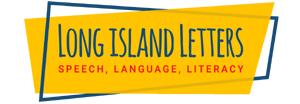A house without a foundation is like the movie The Money Pit . It’s bound to crumble down. Likewise verbal language is the basis for written and social language. Poor verbal skills result in difficulties in expressive writing, academics, and social skills.
Let’s quickly introduce three types of verbal language (narrative, expository, conversational); two of them play integral parts for developing appropriate expressive writing skills. Narrative language (emerges in preschoolers) includes the ability to share experiences, describe ongoing activities and/or plan/predict future activities, explain and tell stories.
Narrative language is different than conversational speech because the former is typically told by one speaker, while others listen. The last type of verbal language to develop is called expository language: its main purpose is to instruct. From third grade on, students are expected to describe, define, and explain information, e.g. oral and written reports for history or science etc., in a coherent manner. As academic demands increase over the school years, there is a larger emphasis on expository verbal language and expository literacy.
Narrative and expository language are the bridge between oral and written language development. Kind of like how the Verrzano connects Staten Island to Brooklyn.
Our language experts are like the Olympic coaches of speech. When we’re working with students, we specialize in both written and verbal skills. After all, you can’t have one without the other. That would be like peanut butter minus jelly.
Our specialized and individualized writing tutoring and intervention focuses on improving the student’s oral and written language skills including:
